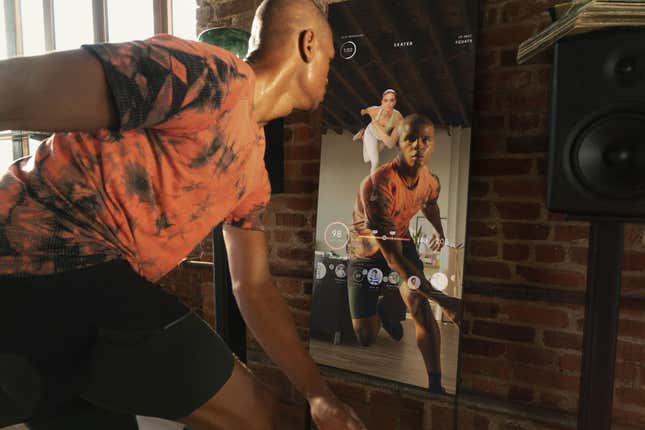From a distance, the poster could be mistaken for the next Marvel movie. But instead of A-list actors, it featured svelte and sinewy fitness instructors, and the campaign was not for a superhero blockbuster, but to tease Lululemon’s new fitness membership.
The athleisure giant bought the at-home smart Mirror device, a combination full-length mirror and screen which streams workout content, for $453 million two years ago, but the company is now rolling out a rebranded and expanded platform for its use called Studio. The name makes no secret of its ambitions to become an aggressive player in content.
Studio officially debuts on Oct. 5, and existing Mirror members will be transitioned over. A subscription, which costs $39 a month, gets members access to 10,000 on-demand and livestreamed classes from Lululemon’s own Studio instructors as well as eight different boutique partners including Forward Space, Dogpound, Aarmy, and more. Members will also get 20% off when they attend offline classes at partner studios.
It’s that last bit that most differentiates Studio from others in the sector, which have also invested in on-demand streamable workouts. Companies have thus far focused on creating at-home options, but are now trying to catch up to consumers who are asking for hybrid workouts. Not confined to their homes, people have welcomed back in-person workouts, but they are not totally giving up on the convenience of sweating from their living room either.
The proportion of fitness consumers with hybrid routines has grown from 46% in 2020 to 65% in 2022, according to consulting firm McKinsey.
“No longer will you have to choose between going to your favorite studio or streaming a class at home—you can have both,” said Nikki Neuburger, chief brand officer for Lululemon.

Flexibility is the name of the game
“What we really want to do is make sure our bundle is the place you can get a whole marketplace of different types of content and that’s the big difference,” said Mike Aragon, CEO of Lululemon digital fitness.
The company is also trying to get ahead of another next big thing in fitness: interconnectivity. The brand wants to formulate a “universal health score” for each user so that the “metric isn’t how many times you are sweating with Mirror but how many times you’re sweating in total,” Aragon said.
Studio does come with an upfront cost. It requires a Mirror, which usually retails for $1,495, but the equipment is on special promotion for about half that for the launch. Lululemon also announced it would launch a free membership program on Oct. 5 that will offer shopping rewards, select complimentary Lululemon Studio classes, and early access to product releases.

Growth in the fitness business is hard won. The market for gyms and fitness providers in the US is expected to grow 4.2% this year, per Ibis World research.
The sector is witnessing increasing overlap between providers as companies try to achieve scale. Barry’s, for instance, has launched indoor cycling Ride classes, while Peloton has gone into running, weights, and this month, announced it would release a rowing machine.
